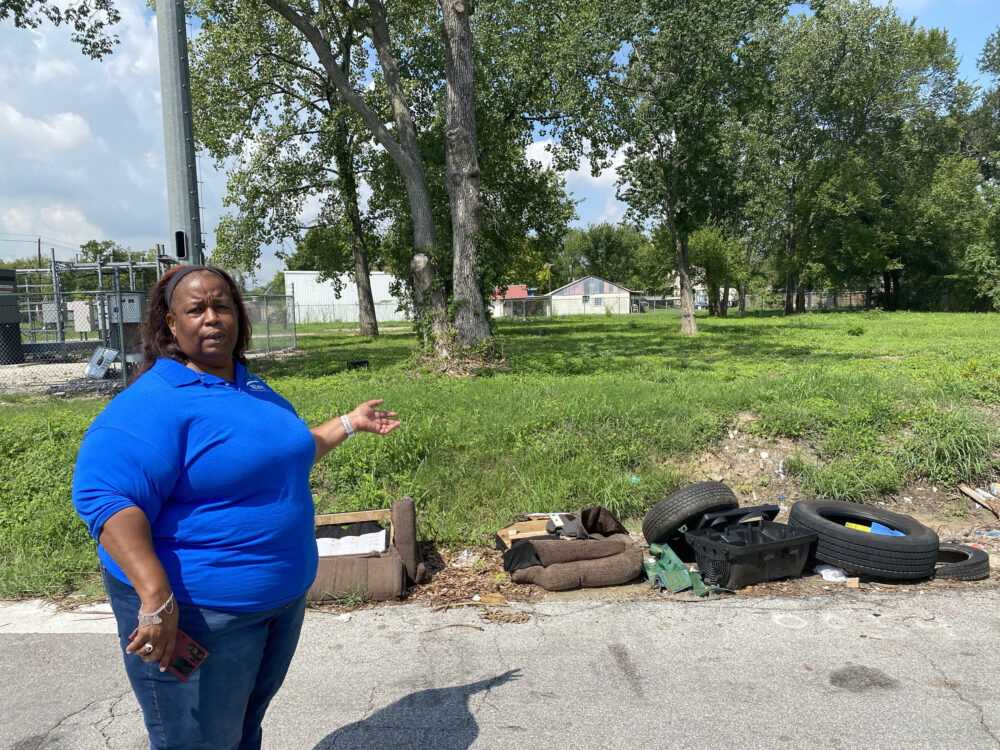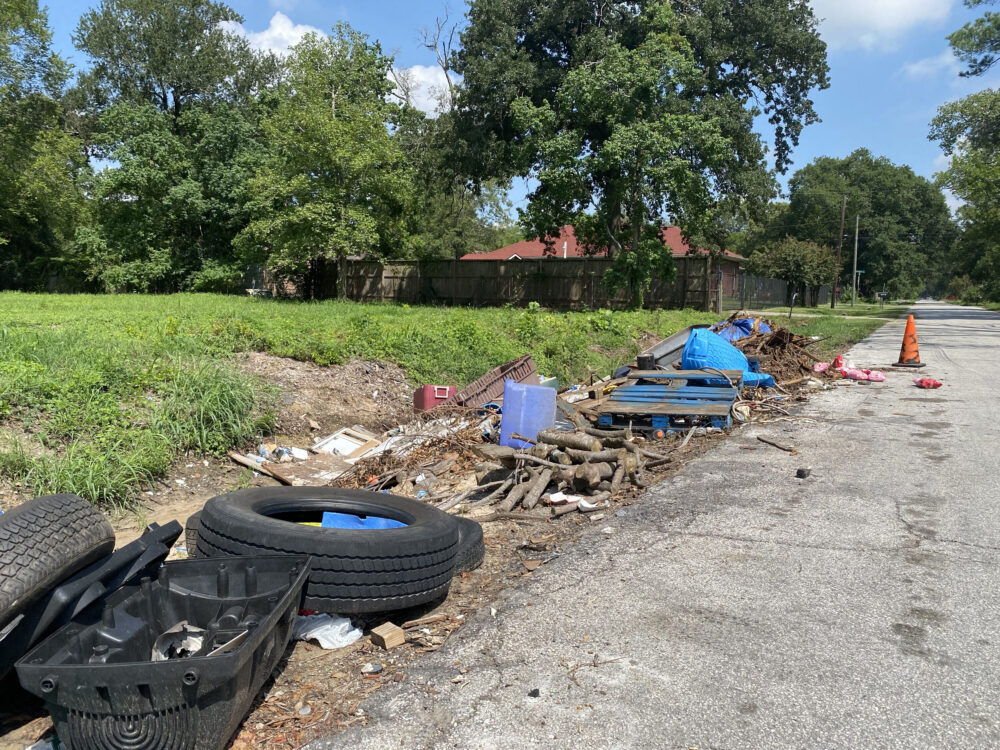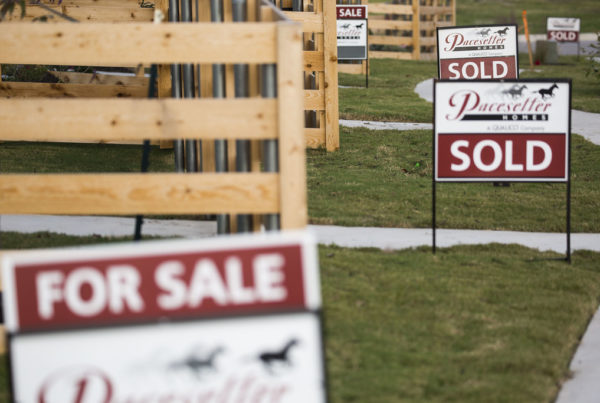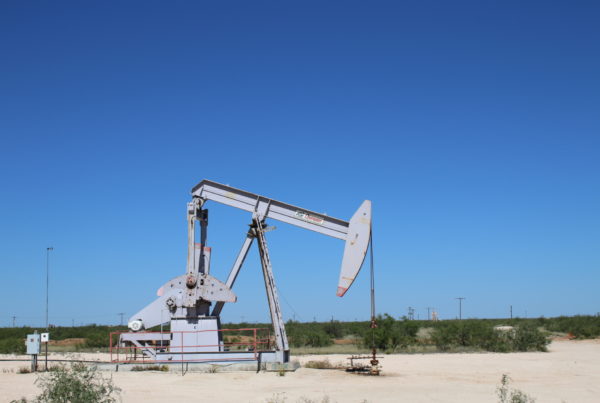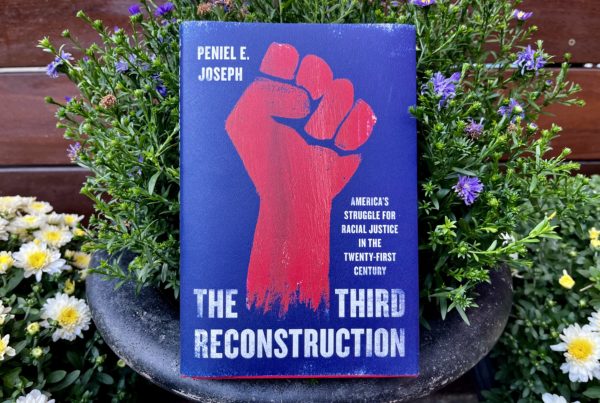Huey German-Wilson has been trying to clean up the illegal dumping in her Northeast Houston neighborhood for years.
“We’ve seen some really horrible things in terms of illegal dumping,” she said.
This has included medical waste, boats, half a car, and 200 tires, according to German-Wilson, who is president of Super neighborhood 48, which includes Trinity Gardens and Houston Gardens.
She’s organized neighborhood cleanups, created spreadsheets of all the illegal dumping sites, and become an expert at using the city’s 311 system. But German-Wilson said she still couldn’t make a dent in the problem.
“Once you got one pile picked up, it moved to another spot,” she said. “And it took years to get that pile cleaned up because people knew they could dump there.”
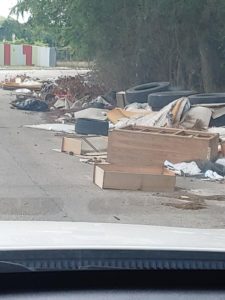
As part of her effort to clean up her neighborhood, Huey German-Wilson would drive around reporting illegal dumping sites.
Courtesy of Huey German-Wilson
German-Wilson said she thinks part of the reason illegal dumping is so bad in her neighborhood is that it’s close to landfills and a depository. On top of that, she believes the city doesn’t respond as quickly or penalize dumpers in the same way they do in other whiter, wealthier parts of the city.
Those allegations are why the U.S. Department of Justice recently launched an investigation into whether Houston is discriminating in its response to illegal dumping in communities of color.
“We will seek to identify, address, and if necessary, resolve the impacts of the city’s response to, or failure to respond to, illegal dumping in communities of color in Houston,” said Assistant Attorney General Kristen Clarke, while announcing the investigation at a press conference in July.
Clark said they’ll analyze 311 records and investigate other agencies that deal with illegal dumping, such as the police and solid waste management departments.
She said this is part of the Biden administration’s commitment to addressing environmental justice issues.
“Illegal dump sites not only attract rodents, mosquitoes and other vermin that pose health risks, but they can contaminate surface water and impact proper drainage making areas more susceptible to flooding,” she said. “No one in the United States should be exposed to risk of illness and other serious harm because of ineffective solid waste management or inadequate enforcement programs.”
The DOJ’s investigation stems from a complaint filed by Lone Star Legal Aid on behalf of Super neighborhood 48 where German-Wilson lives.
“We’ve looked at one neighborhood, and we think that this trend is likely to bear out over the city,” said Amy Dinn, Managing Attorney of the Environmental Justice team at Lone Star Legal Aid.
She said they analyzed 311 data from the city and found that response times in Trinity/Houston Gardens could be more than twice as long as response times in neighborhoods like Upper Kirby and River Oaks.
“So we are really excited about the potential for the impact and benefits that [the investigation] can bring to all black and brown communities in Houston, and maybe really change the way the city approaches solid waste,” she said.
Houston Mayor Sylvester Turner denied the allegations and said he was blindsided by the investigation.
“I’m a native Houstonian, I grew up in one of these underserved, under-resourced communities, so I’ve seen the disparities firsthand,” he said. “But any allegation to say that we are discriminating, that this administration is discriminating, it’s just not true.”
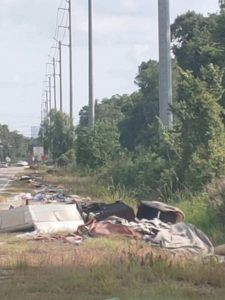
An example of the illegal dumping that Huey German-Wilson regularly finds in her neighborhood.
Courtesy of Huey German-Wilson
Turner said he agrees that illegal dumping is a major problem — and one that disproportionately impacts communities of color across the country.
“Yes, we have a problem here. But it’s much more systemic and it’s much more widespread,” he said.
Turner said as mayor he’s been committed to addressing illegal dumping and other disparities through programs like his Complete Communities initiative, which targets historically underserved communities for investment.
Turner said the city has also taken measures to crack down on illegal dumping by raising the fines for violators and expanding its network of cameras to catch dumpers.
For her part, German-Wilson from Super neighborhood 48, said she hopes the investigation will lead to lasting solutions.
And she said she’s already noticed a difference — chronic dumping spots are getting picked up much more regularly. She said she went for a drive the day the investigation was announced to look at some old dumpsites. They were gone.
“I started to laugh. And then I started to cry,” she said. “Because I thought, how sad is it in the fourth largest city in the country, that the DOJ had to come in, for somebody to hear us on these issues?”


